#rubber guard
Text
Given that Belobog is so full of snow, I'm kinda sad we never get to see any snowmen anywhere. Like that would have made for such a cute bg decoration!
And I think it would be especially funny for Sampo to make them, not out of pure, innocent whimsy and joy, but like specifically to be a menace smzhnsjd
Like Gepard keeps finding little snowmen out around the frontlines. And normally he would just turn a blind eye to this like he does with other things (like the shitty amateur distillery no one thinks he knows about); war sucks, their own damn leader is trying to kill them and Gepard is treading water just trying to keep Cocolia from using his guards as cannon fodder. If his soldiers want to make some snowmen in their downtime, then they should be allowed that. God knows they've earned it.
BUT SOMEONE IS MAKING SNOWMEN THAT LOOK LIKE HIM, DAMMIT!!!
Gepard keeps finding them down the back alleys and more hidden parts of the frontlines! And they all have the same grumpy little face, with blue-painted rocks for eyes and sometimes even gold-colored bullet casings for hair! And he knows who it is the second he finds another little blue haired, green eyed snowman next to it! Fuckin' Koski is sneaking in here, and easily enough that he has the time to taunt him!
Gepard once found a little Snow Geppie with angry eyebrows and red roses stuck in its blushing cheeks that was handcuffed to a weapons rack, which was when he realized someone had pickpocketed his handcuffs. He punches the head clean off the little Snow Sampo nearby, only to discover that it is also holding his wallet, minus all the shield he'd had in it that morning. Gepard kicks it for good measure.
One time he found a little Snow Sampo offering roses to a little Snow Geppie, and he quickly knocked those over too before anyone else could see them or his red face. He swears he can feel Sampo snickering and mocking him nearby.
Sometimes, Gepard finds little Snow Sampos with tiny sacks thrown over their shoulders, all filled with items that are SUPPOSED to be in the depths of the guarded Silvermane storehouses. Sampo technically isn't even stealing anything, he's just showing Gepard that he could if he wanted to, and poor Gepard is going to pop an aneurysm.
Pela: Good morning, Captain. Have you been outside of your tent yet?
Gepard: No. ....Why.
Pela: No reason. Say, have you heard of any break ins recently?
Gepard: No, why.
And Pela holds open the tent flap and there's a ton of tiny little Silvermane Guards snowmen in tight neat rows, all with their little stick arms up in salute, and each one with an actual, stolen official helmet-mask.
Pela: You run a real tight ship out here, huh.
Gepard: (looooong weary muffled sigh as he drags a hand down his face)
#gepo#sampard#hsr gepard#hsr sampo#sampo koski#gepard landau#pelageya sergeyevna#hsr#honkai star rail#I love Sampo being petty as shit just to rile Geppie up fkdsajflasdj#like he is absolutely watching from somewhere hidden nearby and snickering to himself#of a related note I think Caelus and March 7th should be given those little plastic mold thingies that make rubber ducky-shapes in the snow#they go through the restricted zone and just leave them in random places#Gepard trying to conduct serious military business and up on the wall behind him are a row of rubber duckies judging the Guards fjklasjfkld
243 notes
·
View notes
Text
best thing about doctor who is that it is unpoisoned by the irony that most long-running media gets cannibalized by. it is invincible because it is so silly and so full of love and it takes each premise with the exact amount of seriousness it deserves. the closest you get ever is that some of bill’s lines are verbatim little teasing nitpicks of the show that the fandom bandied about, but they don’t come off as mocking the premise, they come off as loving the premise and how silly it is. why’s his time machine anagram work in english? it just does. his name is doctor who.
#fifteen looks into the camera and winks at the audience but its not to say ‘this is all so stupid isnt it lmao’ its to go ‘and there’s more#incredible things to come. aren’t you excited? because we are.’#the day doctor who has mcu ass dialogue ill kill myself#the heart of it is v similar to star trek tos i think#that the silly disarms you and then when the genuine emotion comes in you’ve already let your guard down and it hits you twice as hard#you laugh at mickey getting eaten by a trash can and turning into a rubber dude. and while you’re laughing about that and going ‘wow this is#ridiculous’ then it slaps you over the head with nine yelling that he couldn’t save anyone.#its fantastic it really is#doctor who
58 notes
·
View notes
Text
Happy Valentine's Day - Moon
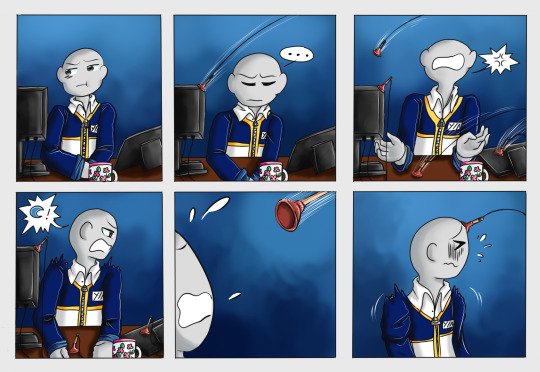
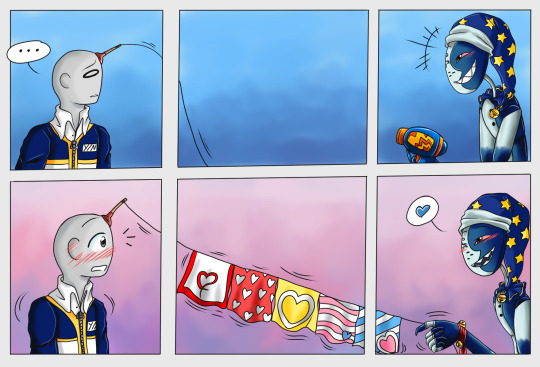
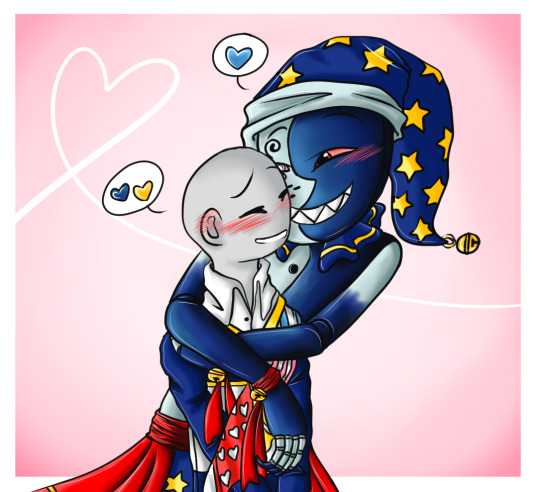
#fnaf#fnaf sb#fnaf moon#fnaf y/n#moon x y/n#dca#fnaf dca#daycare attendant#fnaf daycare attendant#valentine's day#fnaf comic#digital drawing#my art#do not reupload#security guard y/n#Moon knows how to use the rubber dart gun to it's full potential.>:3#It's rather rare that security guard Y/N is in a bad mood so luckily Moon just knew what to do about it.#I'm kinda surprised how nice it came out... but also worked a full day on this.#Found a good set of colors for Moon and I'm pretty happy about the outcome.
73 notes
·
View notes
Text

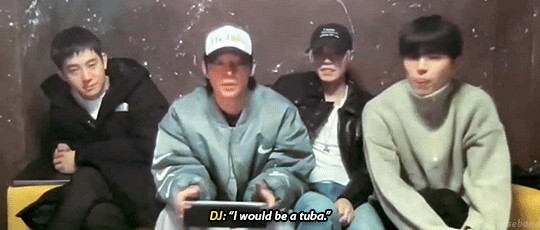
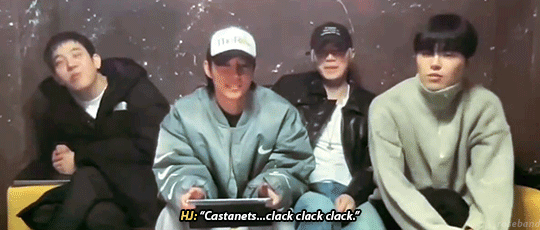
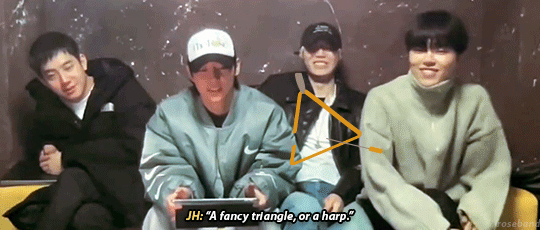
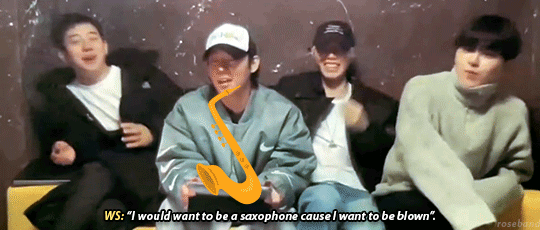
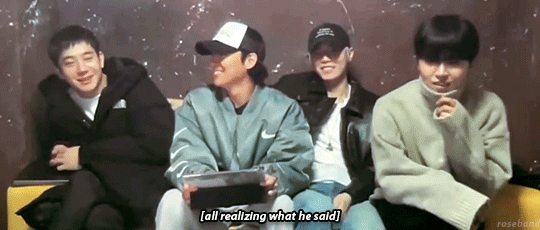

sammy once again showing why the thirst tweets were too tame for them
#the rose#the rose kia forum livestream q&a#kim woosung#lee hajoon#park dojoon#lee jaehyeong#*gifs#*the rose#ceohan#me who's played tenor for 16 years 👀👀👀👀#also you DO NOT want to get blown like a saxophone (or any single reed my dude)#they get BITTEN..... <3 like.... they make teeth guards that are little rubber stickers so your top teeth don't#wear out sax/clarinet mouthpieces#soooo on mar 10th when they give me my vvvip uke and sign it#and talk to me and ask me the same basic ass ''do u play an instrument'' q they've asked every other person w/ vvvip#(which i KNOW i'm going to be incredibly unhinged about btw)#i may tell that man... ''clarinet and saxophone for almost two decades (and also you bite reed instruments a lil with ur upper teeth fyi)''#((this was my most HATED joke in middle school lol))
39 notes
·
View notes
Text
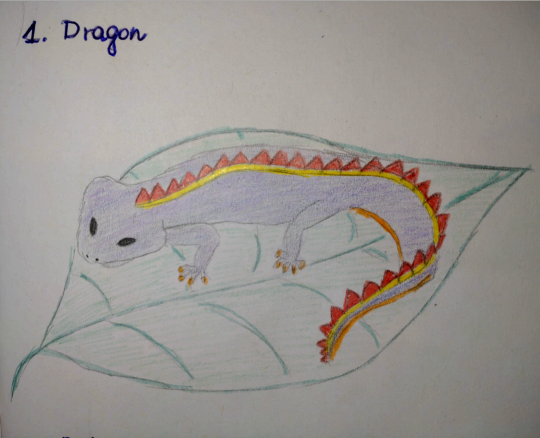

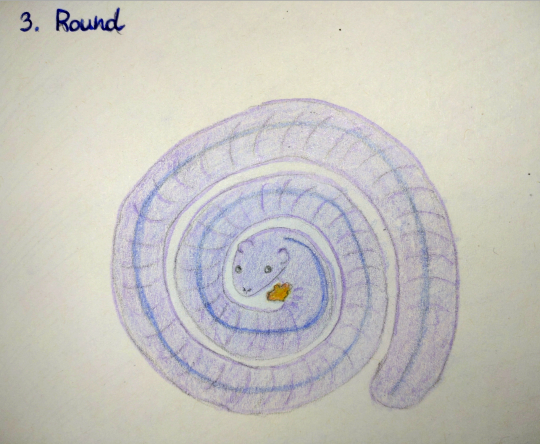
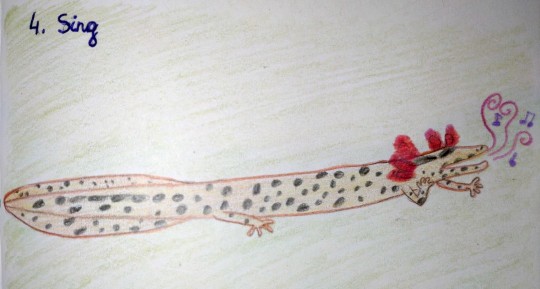
A compilation for the first four days of Amphibiuary 2024:
Day 1: Dragon
Day 2: Red
Day 3: Round
Day 4: Sing
#i dont draw#but i couldnt let amphibiuary pass me by#the dragon was inspired by the crocodile newt#red by Les Mis 🙌❤️#round by a rubber eel guarding/hugging its rock#and sing by a red river mudpuppy#amphibiuary2024#amphibiuary 2024#amphibians
34 notes
·
View notes
Text
In a World Without Heroes: deleted scene
Author's note: The Saturday morning interview scene between Grantaire and Enjolras in chapter 8 originally started from Grantaire's arrival and was intended to go through the events of the scene that has since replaced it. This scene ended up being replaced partly because the characterizations weren't panning out how I wanted (as you see by the end) and partly because it was dragging the scene/fic. Yes, it was good background for the reader, but ultimately (as Grantaire now comments in the replacement scene) this is the same thing Enjolras would have said in every interview since his release from prison, so it didn't make sense for Grantaire to be acting like he'd never tuned in for any of Best Boy's television interviews.
Anyway, I'm finally sharing it here because it's the backstory behind Mabeuf's Manhattan Autonomous Zone and Enjolras's arrest, and also I've been meaning to for uhhhhh two years. Enjoy.
By the time Grantaire texts that he’s on his way, Enjolras feels very nearly relieved.
He’d spent Friday evening catching up on what little cleaning has been neglected since the last time he had a guest — that is to say, since moving in — specifically in order to sleep in Saturday morning, only to find himself wide awake at 9AM with little to do but anticipate the events of the day.
“Hey,” says Grantaire when Enjolras lets him into the building. He’s dressed down from how he usually is at the correctional facility but up from what he wears at the Chinese restaurant, which makes Enjolras feel better about his choice in clothes today.
“Do you mind walking? I’m on the fourth floor.”
There’s hesitation, and Enjolras thinks Grantaire may be about to protest, but when he speaks it’s to say, “Yeah, sure. I haven’t had a leg day in a while.”
“You work out?” asks Enjolras, surprised.
“Nope. Lead the way.”
The walk occurs in silence except for their heavy breathing and a quick apology when someone coming down from the third floor brushes past, and then they’re at the door to Enjolras’s flat.
“Make yourself at home,” he says, heading for the kitchen. “Would you like anything? Tea? Water?”
“Seltzer if you’ve got it, water if you don’t.”
Seltzer. It’s what Grantaire has ordered both times they were out, too, and Enjolras makes a note that he should pick some up beforehand if they do this again.
There’s no reason for them to do this again, of course: with this past week’s interview completed, they’re over halfway finished with the collaborative part of the book, and there will be no reason for them to be spending time with one another anymore. Even with Enjolras’s resolution not to pursue a relationship with Grantaire, the prospect of their burgeoning friendship coming to a halt with the end of their professional correspondence makes Enjolras’s stomach twist.
He re-enters the living room with two waters, placing one on a coaster in front of Grantaire and sipping the other for something to do.
“Thanks,” says Grantaire belatedly. His eyes have been wandering around the flat since Enjolras���s return, and Enjolras wonders what he’s looking for. At last, his attention falls back on Enjolras. “You’re dressed different.”
Enjolras lets his eyebrows quirk in feigned surprise and glances down at himself as though he hadn’t spent fifteen minutes lingering over the decision that morning. When he was merely a law student and the point person for a far-left branch of a tutoring group, Enjolras had had a lot more flexibility in what he wore; since his release from prison, however, his wardrobe has become a rotation of the same six white dress shirts, three tones of neutral trousers, and the occasional matching suit jacket. Even on days when he isn’t working in some capacity or another, Enjolras finds himself dressing as inoffensively as possible in anticipation of someone’s inevitable recognition and the associations to follow. His attire hadn’t been particularly flamboyant before then, but his use for his green rally shirts and blue cozy clothes has certainly fallen to the wayside since.
Today, after nearly five minutes of deliberation, he had settled on a pair of gray-ish jeans, a pale red undershirt, and a blue fitted shirt he’d nearly forgotten that he owned. At the last second before he’d gone down to meet Grantaire Enojlras had pulled a white hoodie over, but already he feels himself overheating in the extra layer.
“Yes, well,” he shrugs, realizing that he should sit and taking the armchair on the far side from where Grantaire has seated himself, “I don’t need to leave today, so I can dress down.”
“That’s what it is! I haven’t seen you in jeans and a shirt without a collar since you got out.” Grantaire’s eyes suddenly narrow. “You aren’t wearing a collared shirt under that, are you?”
Despite his discomfort, Enjolras snorts. “I’m not.”
“I don’t know that I believe you.”
“My deepest condolences.” His retort is met with crinkling at the corners of Grantaire’s eyes before they divert altogether as his attention turns to his lap. Enjolras clears his throat. “I’m not sure I’ve ever seen you in purple. It looks nice.”
Glancing back up, Grantaire’s brows furrow as he looks over his clothes.
“The scarf,” Enjolras clarifies.
The outermost layer of the sheer material is picked up and rubbed under close scrutiny between Grantaire’s fingers. “I guess? I thought it was gray when I grabbed it this morning, but in this lighting it looks blue to me.”
The scarf is definitely purple, but it isn’t worth disputing. “It looks nice,” Enjolras instead repeats.
“Well cree, thanks.”
Taking a deep breath, Enjolras decides to put an end to the stall tactics. “The interview, then? How do you want to do this?”
“Uh. I was thinking just kinda like at the facility? You say what you want, and I respond and ask questions as they arise. Obviously no notetaking or recordings or anything, so it’ll pretty much be like a normal conversation that I know some of the answers to already.”
Nothing about it feels like a normal conversation, but Enjolras braces himself nevertheless. “Let’s begin, then.”
“You sure?” There’s a dubious crinkle between Grantaire’s eyebrows. “We can shoot the shit for a while longer if you want, let you get comfortable and whatnot.”
Resting his hands carefully over his knees, Enjolras arranges his features into a neutral façade. “I’m sure.”
Grantaire sighs deeply, a hand skating over his scarf and jerking the front back from his hairline as he scratches the back of his head. “Okay then. Well, where would you say it all started?”
He’s about to fall back on the polite clarifying tactics he’d been drilled on for televised interviews before when he realizes that he doesn’t have to. “Where what all started?”
Apparently Grantaire holds a similar amount of compunction toward his professionalism. “I dunno, whatever you want. The rally? Broletariat? Activism in general?”
Enjolras has managed to avoid shining a spotlight on his childhood this long, and his parents have made it clear that they have no interest in having their names attached to any of this, but beginning at the rally would feel like starting a sentence in the middle of a phrase. “Combeferre, Courfeyrac, and I have known each other since we were young,” he says, finally settling for their indoctrination to the betterment of humanity as a promising starting place, “and we all were accepted to and attended Columbia for undergrad and stayed for our graduate degrees. None of us were from New York City, and while we were studying, we saw a need in the local community for support, and we started up an afterschool tutoring group in conjunction with Barnard College’s urban teaching program. I believe they’re still running, though I lost touch with them while I was away.”
“On the road,” nods Grantaire.
“In jail.” There’s no use dancing around it now: if Enjolras can’t say it in front of Grantaire, who else is there?
“Right, that too.” Grantaire’s body is draped over the corner of Enjolras’s couch casually enough, but there’s a stiffness in his posturing and the way he rubs the tip of his thumb back and forth along the side of his index finger that makes Enjolras think he’s uncomfortable.
“The Broletariat’s inception was nearly accidental,” he continues. “Feuilly worked in the afterschool program at one of the schools we operated out of, and we got to discussing education law one day while he was packing up and I was waiting on a pupil and agreed to continue the conversation as a secondary location at a later date. It was never official, but it did become regular: once work and classes let out, more and more of us met under the guise of lesson planning or studying or spending time with friends, while under it all we were organizing.”
“Organizing what?”
Enjolras shakes his head. “At the time, we’d had no way of knowing. We could feel unrest building toward something, and we made sure that the channels of communication were open and to keep up with the news and share resources and to — to be prepared for any eventualities,” he says.
“Enjolras, I was there.”
“It occurs to me that announcing our weapons stores to the general public may not go over well.”
“Good thing you’re not announcing it to the general public, then.”
Enjolras sighs. “We were ready for anything, and one day, ‘anything’ finally had a name: Jean-Charles Mabeuf.
“Before his arrest, Mabeuf had been a churchwarden at a local church, a respected member of his community. His friends said he had an expansive collection of books and was trying to grow indigo to start a small business.”
“Does indigo grow well in New York City?” This time, it seems like a question Grantaire genuinely doesn’t know the answer to.
“Evidently not. At the time of his arrest, he was several months behind on rent, had nothing in his fridge, and his famous book collection had dwindled to hardly anything: he was destitute.”
“Tough break.”
Enjolras shoots a sharp look at Grantaire. “Do you remember what happened to him?”
“The prison left him to die of treatable causes, what more is there to know?”
“His landlord took him to court for the missing rent; Mabeuf had already fallen ill and couldn’t make it, and the judge issued a bench warrant. He was arrested for being sick and poor.”
“Well, I’m seeing why I would selectively have culled that bit if I heard it.”
Enjolras feels his nostrils flare at the flippancy, but a small part of his mind reminds him that the Grantaire in front of him is not the Grantaire who drank his way through the entire rebellion and every strategy meeting leading up to it. “I would be surprised if you hadn’t: his arrest hardly made the news. I’m told that his church was in the process of arranging some care package or another for him, but that most likely would have been the end of it if not for the pneumonia.”
Now comes the part that the news and everyone knows: all of the symptoms were recorded upon his intake, but no action was taken to treat him. Mabeuf remained in jail as he waited for his new court date, complaining every day of chest pains and requesting to be moved to the med pod. He was never moved, and on 1 June, at eighty years old, Jean-Charles François Mabeuf was found dead in his cell.
“With the release of the coroner’s report, his church community took to the web for Justice for Mabeuf. The movement against the privatized prison system had already existed and was merely on the backburners, and it seemed like the time for change had finally come.”
“Okay, so wait,” Grantaire interrupts. “I was a bit hazy on the details at the time, but I mostly chalked that up to a whole slew of substances combined with a complete and manufactured sense of total apathy; as it would turn out, I am still just as confused.”
Enjolras leans back expectantly in his seat. “About?”
“A couple of points, honestly, but mostly what an armed splinter from a tutoring club expected to happen.”
A fair question. “I was supposed to go into education law.”
Grantaire blinks. “Okay?”
“There’s no special concentration in legal programs to choose one’s specialization: you take the relevant courses offered, intern with firms that handle the sorts of cases you’re interested in, and once you pass the bar, pursue that area.”
“Got it.”
“Once you start looking into the way the United States education system is set up, it becomes immediately evident how inextricably linked all of these pieces are: children are born in low-income communities. Low income means that the property taxes that fund the schools amount to less, leading to fewer resources and higher drop-out rates. The wages in positions for unskilled labor aren’t enough to live on, so people either pick up more and more jobs until they’ve worked themselves to the bone and, quite often, to the point of their bodies breaking down, at which point the failings of the health system become painfully apparent; are turned out onto the streets, which exposes the failings of our government’s housing system and its rotting capitalist firmament; or turn to more lucrative but less legal job opportunities.
“Two of these are arrestable offenses disproportionately targeted communities of color, and the third skips past those steps directly to killing the dime-a-dozen wage slave.”
Grantaire stares at the coffee table in silence for long enough that Enjolras begins to suspect that he may not have been paying any attention at all before his brows finally furrow and he looks back up at Enjolras. “So what were you expecting to happen?”
He sighs. “I couldn’t rightly say what we expected to happen, but the goal was to draw national attention to any one of these points. If something gave, we thought that the whole system might crash down around it. Exposing the for-profit prison industrial complex as the corrupt, predatory, outdated, inherently racist system it is … it felt self-evident. The whole system is broken, let’s build a new one together that serves all of its citizens equally and doesn’t feature intentional loopholes for legalized slavery.”
Grantaire is quiet for a long time before he finally asks, almost too quietly for Enjolras to hear, “When did you realize it wasn’t going to work?”
‘When’ indeed. Enjolras makes no motion to answer. When had he known? Has he ever known? Perhaps he still doesn’t. “It still might,” is what he finally says. “We haven’t failed yet.”
Grantaire looks affronted. “You almost died, Enjolras.”
“I didn’t."
#in a world without heroes#shitposting sometimes writes#you can see why it got cut/rewritten#and I'm all for an iceberg#but it did annoy me that I couldn't find any natural way to explain how the MMAZ worked#oh I guess it still isn't addressed here#but there were a couple of meet-up points around the island that people were gathering#and they were all going to meet and converge on the [courthouse?] way way south of the island aka the location of MMAZ#but riot police and national guard ended up heading off all of the routes (I had a specific choke-point noted in my outline somewhere)#so the crew that was already at MMAZ ended up getting strangles without reinforcements or resources#and then the waves of tear gas and rubber bullets started#and the rest is IaWWH canon
14 notes
·
View notes
Text

If anyone asks if Dan Heng knows this Caelus, he will say no and walk away.
#the guard of the express (dan heng)#dash commentary tag later#I COME BACK ON TUMBLR AND SEE JACE BEING UNHINGED AF#RAW AND WITHOUT RUBBER POOR SUNDAY
5 notes
·
View notes
Photo

in celebration of my birthday have some fnaf au I’m working on
#rottmnt#als art#rise of the tmnt#april's the night guard btw#theres something surprisingly fitting about a fnaf au honestly#I think it's the pizza#the turtles would totally have a pizza place#the designs are a little plain but idk kinda like em that way#donnies shell is still removable#he's like a mad scientist like how foxy is a pirate? on a separate stage#anyway he needs to be able to make more exaggerated poses so the shell can come off#whats underneath is the soft shell! it's probably made of rubber or something#Mikey's hands are textured so he can climb on stuff without slipping#haven't thought of anything unique about raph or leo but I'm sure I'll come up with something#all their markings still light up btw#but instead of being mystic powers it's leds for their shows
33 notes
·
View notes
Note
I'm imagining Danny working as the rubber duck for Mike/Max/Vanessa, content to sit and hold whatever they need and listen as they work out an issue. Gregory does the same thing except he swerves them off-topic by asking what this thing does, what about this...learning the entire robotics system with the curiosity that every kid has.
This is mostly why Glambear and Freddy have to Gregory-sit on some days. (He finds the term 'baby' offensive. Like, child.) Vanessa is patient and the best at herding Gregory verbally, to their surprise. Mike will happily go on a tangent and then get confused and lost and needs to call Mari in to help him puzzle shit out. Bonnie's on the table like "I would LOVE to be able to blink my right eye again, Dr. Frankenstein! Hurry it up, bub!"
#rubber duck debugging is so useful tho#me when im working on plot fic#or trying to translate 3D into a 2D space and im there trying to make shit look dimensional#me and my giant basket of fidget toys approve this post#kga#knight guard au#answered#ask
8 notes
·
View notes
Text
I’m so glad we got one of those cable guards so I could teach this cause this is the handiest behaviour
#didn’t want her biting the actual cable so I didn’t teach it for safety#but now there’s a thick rubber guard she can hold instead
9 notes
·
View notes
Text
The Guard

The guard supports and serves the civilian population. The civilian population supports the Guard and it’s work. Hand rubber or hand unsheathed, hand in hand for your community.
#The guard supports and serves the civilian population. The civilian population supports the Guard and it’s work. Hand rubber or hand unsheat#hand in hand for your community.#rubberguard#rubbergloves
3 notes
·
View notes
Text

He was like "DON'T. look up ship art of my husband." And i said. "Ny~okAy!" And searched ship art of Our man. ❤️
#im so sorry. also he was slightly joking hes just defensive and weird and he thinks hes the only one in here allowed near him now#like a fucking. untrained dog lmao#resource guarding? in dogs? except its about his Man. losing my shit. i was so correct#system babbles#dude striker was here before you.and moxxie and blitz and kiba and Inthrum and like.everyone. you dont give a shit abot them at all you just#hate me because of source. and also because im infuriating and annoying and you hate me for my autistic rubber ducky swag#for my bible THE bible swagger. you just wish you noticed me before the fandom lost their shit about us❤️#fictive#introject#partner system#vox#alastor#lucifer morningstar#osdd#actually plural#alter art
0 notes
Text
American-Made Rubber Fingertip Protectors by Tory Inc.
Tory Inc. offers premium rubber fingertip guards for enhanced grip, protection, and comfort. Made in the USA with natural rubber (latex-free option available), these finger cots are thicker and more durable than competitors'. Perfect for crafters, artists, and professionals - keep your fingers safe and improve dexterity!
0 notes
Text






Top On Sale Product Recommendations!
Car Wheel Arch Bumper 1.5M Anti-Collision Strip 2/3.5/4.5CM Rubber Universal Anti-Scratch Protection Strip Bumper Trim Accessory
Original price: USD 29.22
Now price: USD 18.99
Click&Buy:
#aliexpress#begouristore#car wheel bumper strip#automobiles car rubber bumper#rubber bumper strips for cars#rubber edging for bumper car#wheel arches protector#wheel arch moulding#car rubber bumper corner guard#car protector arch#wheel arch car trim#wheel arch trim universal#wheel arch trim#wheel arch rubber protector
0 notes
Text
tim walz is credited for the free public school lunch program that was actually a years-long grassroots campaign by the mother of philando castille. her son would pay for kids’ lunches out of his own pocket was murdered in cold blood by the cops that walz has funded and protected as they terrorize black minnesotans and their friends and loved ones with impunity (to such an extent that the department of justice found the extrajudicial killings carried out by minneapolis police to be exceptional). this election will be a special kind of hell for twin cities residents who have not seen any resolution to the summer that walz sent the national guard into our neighborhoods to fire rubber bullets at us on our porches. these people will not make our lives better. these people are not “easier to organize against”. harris and walz are blood-drenched terrorists with big cheesy grins on their faces
5K notes
·
View notes
Text
Lucifer throws rubber ducks at Alastor to shut him up.
It actually worked for the first few times too, because it was so random that it caught him off guard, as very few things do. With his large collection and how very few of his creations he was actually proud of, Lucifer had a lot of ammunition. He wasn’t about to embarrass himself by scrambling to get them back afterwards, but he did wonder what happened to them. Incinerated, he would guess.
But no, Alastor likes entertainment, and after he got over the fact the literal King of Hell’s best line of defense was rubber ducks, he was very entertained by the little things. There was a growing collection in his radio tower, and he had learned quickly that there was more to them than met the eye. He’d been quite displeased when one had left his coat singed from spitting fire, but despite all their tricks, none were particularly harmful.
Alastor hadn’t been sure where these ducks were coming from, but after plucking one off the floor that had a remarkable resemblance to the Radio Demon himself, he was beginning to suspect they weren’t exactly off the shelf. And wasn’t that a thought, the devil himself spending hours meticulously crafting toys. Even more so interesting that he spent some of that time making one of a demon he hated so much. But he keeps them all the same.
Chucking them at Alastor’s head becomes a whole lot less effective at getting him to shut the fuck up after a while. That didn’t stop Lucifer from wanting to throw things at him, and it wasn’t destructive to the hotel in the process. Probably not a bad thing, to be clearing out his room of so many ducks. And if a certain gothic tower is now full of them instead, well… who’s to say.
*quack quack* I’m losing my mind, can you tell
#Lucifer and his duckies mean the world to me#he has ducks of everyone at the hotel#but only Quackastor is worth throwing#radioapple#appleradio#duckiedeer#that ship name is too cute for what they are but I love it#hazbin lucifer#lucifer magne#lucifer hazbin hotel#lucifer morningstar#hazbin alastor#alastor#alastor hazbin hotel#Hazbin hotel#hazbin spoilers
4K notes
·
View notes